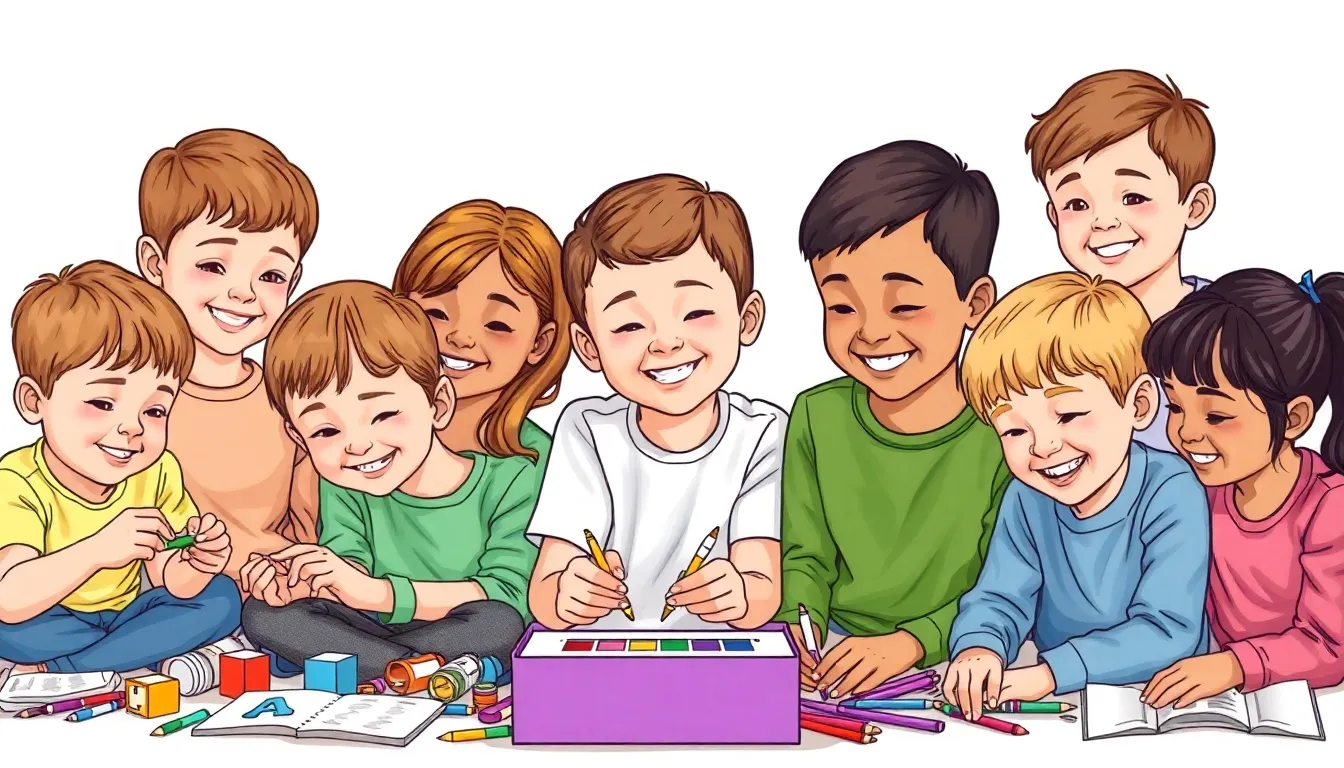Table of Contents
ToggleCognitive development activities are like a gym workout for the brain, but way more fun and a lot less sweaty. Imagine flexing those mental muscles with games that challenge thinking, problem-solving, and creativity. Whether it’s through puzzles, storytelling, or interactive play, these activities not only boost brainpower but also keep kids engaged and entertained.
Understanding Cognitive Development
Cognitive development involves the processes through which individuals acquire, process, and understand information. Engaging in cognitive activities significantly enhances these capabilities.
The Importance of Cognitive Development
Cognitive development influences a child’s ability to think critically and solve problems. It plays a crucial role in academic achievement and social interaction. Engaging in cognitive activities strengthens memory and enhances decision-making skills. Research indicates that frequent cognitive engagement leads to improved attention spans and better emotional regulation. High-quality cognitive activities promote creativity, which fosters innovative thinking. Early exposure to stimulating environments sets the foundation for lifelong learning and mental agility.
Key Stages of Cognitive Development
Cognitive development occurs in distinct stages, each characterized by specific skills. The sensorimotor stage, from birth to around age two, focuses on sensory experiences and physical interactions. The preoperational stage, occurring from ages two to seven, features symbolic thinking and imagination. Concrete operational stage follows, typically from ages seven to eleven, emphasizing logical reasoning and mastery of basic mathematics. The formal operational stage, starting at age twelve, introduces abstract thinking and hypothesis testing. Understanding these stages helps caregivers tailor cognitive activities to match developmental needs, enhancing learning outcomes.
Types of Cognitive Development Activities

Cognitive development activities come in various forms, catering to different ages and skill levels. Selecting activities that align with a child’s developmental stage enhances engagement and effectiveness.
Age-Appropriate Activities
Infants benefit from sensory play, such as exploring different textures or colors. Toddlers enjoy simple puzzles, which enhance problem-solving abilities. Preschoolers can handle more complex tasks, like sorting objects by size or color, fostering critical thinking. School-aged children thrive on activities that require strategic thinking, such as board games or building projects. Adolescents can engage in discussions that require analytical thinking, enhancing their reasoning skills. Tailoring activities based on age ensures children receive appropriate cognitive challenges and support.
Examples of Effective Activities
Puzzles stimulate logical reasoning while improving memory skills. Storytelling fosters creativity and helps enhance language development. Role-playing games encourage social skills and imaginative thinking. Memory card games challenge recall abilities, promoting attention and concentration. Art projects allow for self-expression, aiding emotional development. Incorporating these activities into daily routines offers diversified opportunities for cognitive growth, making learning enjoyable and rewarding.
Benefits of Cognitive Development Activities
Cognitive development activities offer various benefits, enhancing children’s mental capabilities through engaging exercises.
Enhancing Problem-Solving Skills
Problem-solving skills improve through activities that challenge children’s thinking. Engaging in puzzles encourages them to analyze situations and develop solutions. Games like chess or strategy-based board games teach foresight and planning, enhancing critical thinking. Activities that require decision-making help children assess options and outcomes. Group problem-solving tasks promote collaboration and communication, crucial for social development. These challenges foster resilience, helping children learn from mistakes and adapt their approaches.
Boosting Memory and Attention
Memory and attention significantly benefit from cognitive activities. Playing memory games sharpens recall abilities and reinforces neural pathways. Activities that involve storytelling enhance listening skills and encourage children to remember details, fostering comprehension. Moreover, engaging in tasks with varying complexity maintains interest and increases focus. Regular involvement in such activities strengthens overall attention spans, making it easier for children to concentrate in educational settings. Diverse challenges also stimulate cognitive functions linked to memory retention, which are essential for academic success.
How to Implement Cognitive Development Activities
Implementing cognitive development activities effectively requires thoughtful planning and execution. Engaging environments and supportive adults significantly enhance children’s learning experiences.
Creating a Stimulating Environment
Creating a stimulating environment fosters curiosity and exploration. Bright colors and interactive materials attract children’s attention and encourage engagement. Dedicated spaces for different activities allow for varied learning experiences. For instance, a reading nook with diverse books promotes literacy, while a sensory corner invites exploration through touch and sound. Including educational toys, such as puzzles and building blocks, also inspires creativity and problem-solving. Regularly rotating materials keeps the environment fresh, encouraging children to approach learning with enthusiasm.
Tips for Parents and Educators
Parents and educators play a vital role in facilitating cognitive development. Prioritizing age-appropriate tasks aligns activities with developmental stages. Observing individual interests can guide the selection of activities, ensuring relevance and motivation. Incorporating play into learning fosters a love for exploration and discovery. Setting aside consistent time for cognitive activities helps establish routines. Celebrating small achievements boosts children’s confidence and motivates them to tackle more challenging tasks. Regularly engaging in discussions encourages critical thinking and articulation of ideas, helping children express themselves and develop their reasoning skills.
Cognitive development activities are essential for nurturing a child’s mental growth. By engaging in various stimulating tasks, children can enhance their problem-solving abilities, critical thinking skills, and overall cognitive functions. These activities not only promote learning but also make it enjoyable and rewarding.
Creating an environment that encourages exploration and curiosity is vital. Parents and educators can significantly influence this development by selecting age-appropriate tasks and fostering supportive interactions. Celebrating achievements and encouraging discussions further boosts confidence and motivation.
Incorporating cognitive activities into daily routines ensures that children are not just learning but thriving. This holistic approach to cognitive development lays the foundation for future academic success and social interactions.




